Hello again, dear fellow humans.
I do believe it’s spring.
I’m lucky to be alive and well and happy for the most part – and more than anything I hope that you can say the same. We live poised in such strange times.
I’m excited to report to you that I have finished the lucerne fence enclosure. Affordable and easy to construct for a small human with few resources and even less skill, I’ve chosen to build it almost entirely out of shit and cheese, materials that I’ve laced carefully together with snot. Theoretically enabling me to grow at least some percentage of Yummy One myself, I aim to use it to make sustainable living sustainable.
I empty the bird houses out onto dug-in paper sacks from the Yummy One I’ve had to buy all winter: the houses’ contents – of woodchip and fire ash, the obligatory filth of fowl – is upended and topped with a layer of molehill earth that I’ve collected from across the meadow. It has become warm now, lightened by their work not mine, and falls to mark this change in season.
“Progress” is a word I haven’t had much truck with for a while. Subsistence farming just isn’t a goal-driven lifestyle. Once in a while though – and I’m super pleased to be able to share the moment with you – way markers do come.
Perhaps all lives are a treadmill.
When I take a swede from the sandbox in the barn – the last of our root vegetables – it has begun to grow. There in the dimness, its moon white shoots have pushed out from the neck that I cut short in October, forming leaves that have never seen the day. They’re very strong. The forcing stems hardly give to my touch.
I’m experimenting, on my windowsill, with its regeneration.
Maybe in this step-change of seasons, we can take pause together. It's a suitable moment to talk of progress and progeniture.
Here we are again at the time for birthing – one year since I began to write to you. I’m approaching the tenth anniversary of my little girl arriving in the world. She calls the baby goats and lambs her birthday presents. But it’s a strange time, as I say – and bittersweet – to celebrate such things. Humans stand so unsteady in our own cycles of advancement.
In just a few years for instance, we’ve recently heard that we’ll be able to farm children in artificial wombs, genetically predisposed to razor sharp concentration and organised bedrooms. In utero, of sorts – their embryonic progress showcased in real-time data and available to view remotely from an app on a mobile phone – our hopes will bloom, transparent in their blind, monitored pods.
And elsewhere, those of us who are no longer young see legacies we do not wish to leave.
Now’s a good time to think about generational change.
This episode of Walking With Goats therefore is less of an outing and more of a rest stop. A chance to chew over destinations in general, and where our own journeys end.
In one of the most beautiful spring mornings that I have ever witnessed, I walk my six sheep through the new green of the woods. The sky is an open promise and the sunlight is wet on every branch and twig, but in the softness of birdsong – perhaps every three or four minutes, I suppose – a long, low rumble turns the air.
This is the sound of the army range. The stillness is such that it travels 30 miles from the empty hills where today they practice war. Cofiwch Epynt is still scrawled on walls sometimes in local towns, to remember the forced removal of the community who farmed the Epynt. Some years ago I had cause to drive its empty roads. There are still houses. If you stop your car and look in through their windows, the mimicry of life has been retained for the sake of the soldiers’ practice. There is a pub. It has a sign above the door. Inside, there are false beer taps and a bar where no friends sit to talk, with tall stools still placed all the way around it.
I watched with horror this morning, before going out to walk the sheep – before even opening the curtains to this beautiful day – what has happened and been suppressed in Ohio. A week ago it took place and we heard nothing.
The roiling clouds of vinyl chloride smoke that rose above their houses were on the left of my screen, and on the right a list of what was “trending”: Rhianna, UFOs, the Superbowl, Sam Smith.
The poisons released upon the farming heartland of America – communities that include the Amish – were already killing animals, wild and farmed, 100 miles away.
Chiefs win Superbowl the blue-grey sidebar said.
So it is that I think of that pub, whose name might now be real or false, by the side of a silent road on top of the Epynt mountain range: of the two dimensional life displayed through the dust on its window.
Parenthood is a thing I thought would never happen to me. Diagnosed with PCOS in an era when I believed in diagnoses, I was determined by the medical experts to be “sub-fertile”. PCOS, I was told, was a metabolic condition – although apparently this didn’t matter because I wasn’t overweight. (As an aside for other women who may have experienced this verdict, I will mention – as the medical team did not – that for me the metabolic element of PCOS meant that any consumption of sugar led to psychotic levels of rage and depression that were in fact as easy as (savory) pie to eliminate with a tincture made from the root of elecampane.) As “sub-fertile” though, I certainly was the kind of woman destined to end up booking an EctoLife Pod.
The story of how I became pregnant is long, complex and perhaps controversial. Having alluded to it, nonetheless I won’t tell it here. Perhaps one day. Suffice it to say that when I had cause to visit a primary school at any point in my 20s, I left crying, determined to devote my life to hedonistic intent.
I call my daughter my miracle child.
She’ll be going back to school very soon, my wild miracle child. She’s had a few stints in the nearby primary over the last few years. Mostly we’ve been in home ed since 2020 though. At first it was in fear of the uncomfortably polysyllabic ‘2019NCov’ – I staggered my own lockdown with the rest of the world’s, but believe me I went into one. Later, as it became clear that Westerners weren’t going to crawl around asphyxiating in subways like Iranians seemed to – and once there was school again – she returned, too big for her uniform but keen to get right back to ParentPay and queuing.
School had changed in the interim though, of course. Most of it took place in biosecurity bubbles, singing had been made illegal, the bottom half of everybody’s faces had become portals to hell, which needed to be barred up with broad portcullises of attractive cotton. Real portcullises had been installed too, and there were stickers on the ground, which told you where you were allowed to wait in front of them – two metres apart and efficiently discernible from any kind of community gathering. Child and parent, hand in hand until the siren-wail of the day’s first ‘bell’.
And, just as I had the year before, disinfecting my 25 kg sacks of oats and newly delivered crossbow, upon my return to society, I stuck out like a sore thumb once again.
Rather than vociferously advising others to buy their own hazmat suits though, this time round I was committing a far less forgivable act of social asymmetry. It was I who was maskless, queuing beneath the WEAR A MASK signs.
I’m telling you all this in detail because it’s important to ask how someone prepared to sacrifice their own reputation – the confidence of others in their mental state – by screaming “KILLER VIRUS! BUY VITAMIN C NOW!” on a WhatsApp broadcast to every single person they know, could be effected by such complete change. The Cassandra impelled to save the lives of every phonebook contact only one year beforehand had become, by June 2021, seemingly indifferent to others’ welfare.
I did not stop caring though. Nor did I stop being afraid.
It was harder to walk barefaced under the sunshine, alone in masked crowds, than to sit in my living room wiping isopropyl alcohol across the post. I’d cried in bed at night, foreseeing more deaths than anyone could count while Boris Johnson gaily pronounced that Heathrow’s gates would remain open and Fran went on her anniversary holiday to Blackpool – although admittedly with a large number of antibacterial wipes. But that was nothing in comparison to arriving at the understanding that, while the now neatly named COVID19 was not a death ray, it was the harbinger of a very different world.
How did you know it was coming? other kids asked my daughter. Is your mum psychic or something?
But they didn’t ask what knowledge lay behind my bareface now.
Another train derailment of hazardous chemicals this morning, in Michigan, a nitric acid spill from an overturned truck in Arizona, a 5 acre fire of plastics in Florida brings the hazmat suits in and, as the next column of dioxins meets the heavens, those who understand the mechanics beneath the Fourth Industrial Revolution can no longer resist suspicion of foul play.
I walk to the goat house, but the babies are not here yet.
The air is soft with the forgiving rain of spring.
It is fitting now that I should tell you the story of Molasses, the lamb who was born and lost to me during lockdown.
Here is a picture of him:
My daughter pulled him in a cart. Sheep sorrel was his favourite nibble – I edged the vegetable beds with it, much to my mother’s mirth, in expectation of his future. He was weak but he was so full of love for us and us for him that I genuinely believed that he would live.
Mo was abandoned by his flock. His mother, Liquorice, withheld her milk from him, choosing instead to feed his sister. In the barren grey of my first lambing, the sight of her in the battered field, turning her body from him to deny him life, stands a grave landmark on my journey towards self-sufficiency.
Now, I know. But I was ignorant. And I was on my own. Wales, and all the world, clawed into stillness by the virus, my memory of that slate-cold day is very clear: holding Molasses and running along our hedgerow, as on the other side a neighbouring farmer drove his own flock down the road.
“She won’t feed him! What can I do? Will she change her mind?”
“Not now I shouldn’t think.” On the quad bike, he looked back once to where I’d run out of ground and called out, “He might make it.”
You cannot – they will say after lambing – save them all.
But I had nothing; no milk replacer, no bottle, no teat. I put him in the Rayburn warming drawer, a fragile bag of bones and woollen curls, and we made him a feeder from a ferret drinker and a rubber glove. I mixed the powdered cows’ milk that I’d frozen for us as the supermarket shelves were emptied. Given two month’s head start, still in my ignorance I had failed to equip myself to save his life.
And yet miraculously, he did live.
For many weeks, hardly growing, cossetted and cuddled, he lived. The powdered milk running slowly out, we waited for the Lamlac delivery. When he cried at night, I trekked up and down the stairs to offer him each new design of bottle. My dog cleaned him. She knows every lamb now as a ‘Mo.’
What can I tell you? The Lamlac came after many weeks’ wait and I mixed him a bottle and fed it to him and he died. He died in shock. It took him three hours, shaking in my arms. I screamed.
There are so many things that I would change about that first time around if I could, but none of us can go back to reshape our actions. I will be one of many who regret what was done – or left undone – under the metal skies of that year’s lockdown.
I don’t remember the day of Mo’s birth, but it was somewhere in this faltering part of spring – and it was May by the time he died. I know that.
Under the novelty of this year’s sunshine, I clear the vegetable beds that I edged with sheep sorrel in 2020. There was little meaning I could take from the loss of Molasses back then. We painted a stone for him, my daughter and I, and set it down next to her treehouse. Kindness matters, I told her, even if it doesn’t win.
Countless times we had taken Mo to the field just to watch the other sheep reject him. Only Moana – some weeks his senior and strong and curious – seemed to recognise him as a lamb. He had known love, I said, because of us. Even if we now grieved.
Such were the frail lessons that could be drawn from a year of falsehood.
Going into subsistence farming just before the pandemic – looking for meaning, among other things – I had never, to my memory, heard the term ‘Fourth Industrial Revolution’. Like others familiar with Greta Thunberg and Jane Goodall, I may have felt the syllables faintly familiar, channelled elegantly as they had been (as all Marc Benioff’s polluted streams of consciousness flow), unobtrusively, throughout Davos, about the shoulders of such icons, and over the planes of our minds in the glossy ink of Time Magazine.
The journey towards self-sufficiency – which was a personal journey, of curiosity – came to be driven instead by waves of crises. But it has its own rhythm, to produce the food you eat. It sticks an anchor down amidst those tides.
It is curious, to have found the meaning I sought from this lifestyle, only to understand that it is what the architects of 4IR wish to take away.
As they must be in Ohio, our spring beds are now ready for sowing. We have saved as much of our own seed as we can.
Fran and I have this conversation about the way that time works – because I’m not entirely certain it’s linear.
She said, “The human brain is the world’s only time machine.”
And she described a process of generational understanding, in which we come to comprehend old losses – even those which were not ours – more completely as we age; the losses of our parents and of theirs too, as our own children become lost to us.
It’s a beautiful concept, although painful.
I drive my daughter to see family – as we are allowed to do this year – and all the trees are sundials across the February fields.
We used to sit, when she was younger, on the journey to school, my left hand holding hers in silence between the small absences of each gear shift. We never used words for the exchange. Soon it will be happening each morning again, this drive in which she enters a future I cannot determine for her.
Sometimes she says she wishes she’d been born in a different time.
In the last few days before her new term, we take a walk across our own field, and she runs ahead of me, looking back over her shoulder at me and laughing. And these are the moments when I am most certain: time is not linear. These moments, of having and losing both at the same time.
2021: the rumble of news stories turning the air. It was a pandemic, we heard, of the unvaccinated. I sowed and planted and fed and cropped, and I cried to Fran without hope of a remedy, standing on the path in the vegetable garden and looking at our food supply.
The camps they had built for the unvaccinated were real.
Excluded from the supermarkets in France, placed under house arrest in Austria, fined thousands of Euros in Germany and robbed of children in New Zealand. Sacked from jobs, barred from higher education, derided and told by mainstream media that our deaths would be deserved, many of us who refused to take it did so on the grounds of our own health. For my part, my father suffered for 11 years with an autoimmune disease that left him screaming in pain and chairbound, on oxygen. With no long term safety data on autoimmune response, I chose to wait.
Some chose to abstain on principle. Children were requested – I forget which country now, but I think it was Germany – to stand before the others at the front of the class and declare their status.
The camps were real, I cried to Fran. And they still are.
There are many ways to put an animal that is running free into a cage – but one thing you never do is chase it.
Today is the 27th of February. It is the day in which they meet to ratify the Pandemic Prevention, Preparedness and Response Treaty, and also of my daughter’s return to school. The greatest shifts of our world’s mechanical progress offer no rumble to warn us of their presence – and our own lives turn and must be attended to.
Over the last week, two beautiful Baby Darlings have been born to Thorne. After some days fighting for the strength of the weaker, I’m now confident they’ll both live. Lucy was injured by a jealous tup and I watch her with anxiety, taking her small piles of hay so she needn’t stand.
I do worry that Walking With Goats isn’t quite as frequent as it ought to be because of the amount of time I spend with the animals, shifting organic matter from place to place according to its stages of decomposition, or in the winter producing correctly sized sticks to keep us warm. Even writing in the middle of the night, the screaming of a fox takes me away from the laptop and out onto the hill with a headtorch. In addition to her pain, Lucy will birth very early this year. And I don’t know if this will mean greater danger to her new lambs, meeting their lives out in the fallow February landscape.
Because of the infrequency of the writing, I want very much to try to offer you something of import with every episode. On this occasion, it’s the benefit of my few years’ experience. I see my daughter and I cherish what is wild in her. I would never try to contain it. But it is necessary sometimes, for their own treatment and care, to cage the animals I love.
If you ever wish to trap a roaming spirit – one who would naturally fear containment – I can tell you the ways in which it’s done:
You can make the cage the appealing, habituating them to it without closing the gate, feeding them from a trough inside on a daily basis. You can deplete the land on which they run free until there is nothing left for them except to leave it behind. You can make the cage a place of safety; what seems a haven amidst the holler and commotion you create elsewhere. You can birth them into it – so that they don’t know a free world exists outside. Or you can funnel them in.
The pandemic treaty will place into the hands of the WHO all 194 subscribing nations’ sovereignty on matters such as forced vaccination, lockdowns, laws on masking and international travel in the event of any Public Health Emergency of International Concern.
And so many potential PHEICs exist already: chicken flu and monkeypox and Marberg, covid (again), and Russian biowarfare, and RSV. Another once in a century pandemic is, we hear, just around the corner.
They’ve told us on many occasions. The time has been plentiful, to decide upon our actions: the ones that we will not regret the next time round.
In his beautiful 1889 work, Time and Free Will, Henri Bergson depicts the non-linearity of time, as it’s experienced by human beings, with a concept he calls duration. Duration is the coexistence of memory with life. It is the dimension that gives us meaning.
As humanity impels itself towards a future in which genetically engineered children – surveilled and bet upon in human capital bonds markets, chemically rewarded for brain-monitored attention spans and discouraged from abstract thought by haptic accessories – as we speed, I should say simply, into our future – we must ask ourselves why.
Not the why of cause, or of result. We must ask ourselves non linear questions.
2022.
There were new reasons to speak of supply chain crises. An enemy lurked upon the hill and it was his monstrosity that robbed our lives. Poverty was solidarity, war was waged for the good of peace, disinformation called for censorship and last year’s truths held no obligation now.
If the vaccine had never been tested against transmission prior to release, it didn’t matter – who spoke of vaccines now? It was personal choice. Between the news of Ukraine, there was Strictly and VR gaming. If defibrillators were being installed in every school then they should always have been there. Whether the safety trials were in litigation served by a manager of their clinical trial sites was nothing more than anti-vaxx conspiracy Twittertwatter. Looking back was churlish. What everybody needed now was to move on.
To move on, in whichever direction remained open – away from all the talk of cruelty and harshness and fear.
One of the main uses of vinyl chloride is in the production of children’s toys. Coming up to ten years old, my daughter is almost beyond toys now.
We use plastic in many other things of course – some we are utterly reliant upon. The alcathene pipe that brings our water supply from the spring reservoir down to our house. Or the bags we use and reuse, freezing foodstuffs we’re unable to store in other ways. I work on the premise that such luxuries will end for me though.
Freezers and plastic bags are the hallmarks of participation in an economy; a “right” our government – alongside almost all others globally – is in the process of making contingent.
I grew up as a privileged white Westerner, believing my “human rights” to be inalienable – and of course to include little details like freezers and plastic bags. The political space within which my daughter stands is smaller and differently shaped.
Dressed in her new uniform, she leans back against the kitchen wall and we draw another tiny line: two centimetres higher than the last – left there only two months before it. Unremarked and swift, the food I make has made her.
#Pfertility is a hashtag that crops up a lot these days. Considering the trial data relinquished by Pfizer under the Freedom of Information ruling, seems like a lot more women are going to end up booking an Ectolife pod.
On the 2nd of March, Lucy births twins. Beside our own creek, she finds a hollow where the bare sun can dry them and claws them upright with one hoof to bring them to her milk. She chews their cords and licks them clean. I sit watching her with a brief sunlit heat on the crown of my head and feel the life of the world, inching into its new year.
I processed him – Mo. This is what I’ve been trying to build up to tell you. And I need to tell you, you see, to explain the meaning I’m talking about – but I don’t know what you’ll think of me for it.
It was hot that day – sudden summer – the morning after he died. I had him in a lidded metal box. In the sun, I carried him to the top of the hay field and made a gantry to hang him from.
How could I take the life of another animal in future, yet bury Molasses because I loved him? Just to save my own feelings? I could not. His was the first sheepskin I ever took and the first meat I learnt how to prepare.
Throughout the pandemic, my daughter asked why so frequently – great, aching why questions, that couldn’t be answered through any understanding of causality. Questions with no beginning and no end.
In the new sun, I watch Lucy offer her children life.
In this present springtime, I see her through the duration of winter.
Images by Francesca Swift.

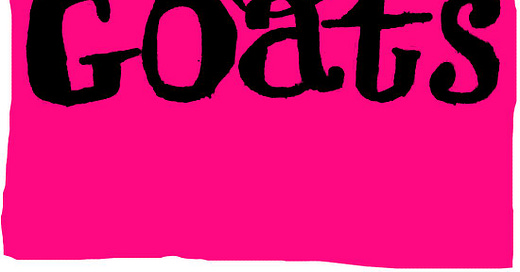


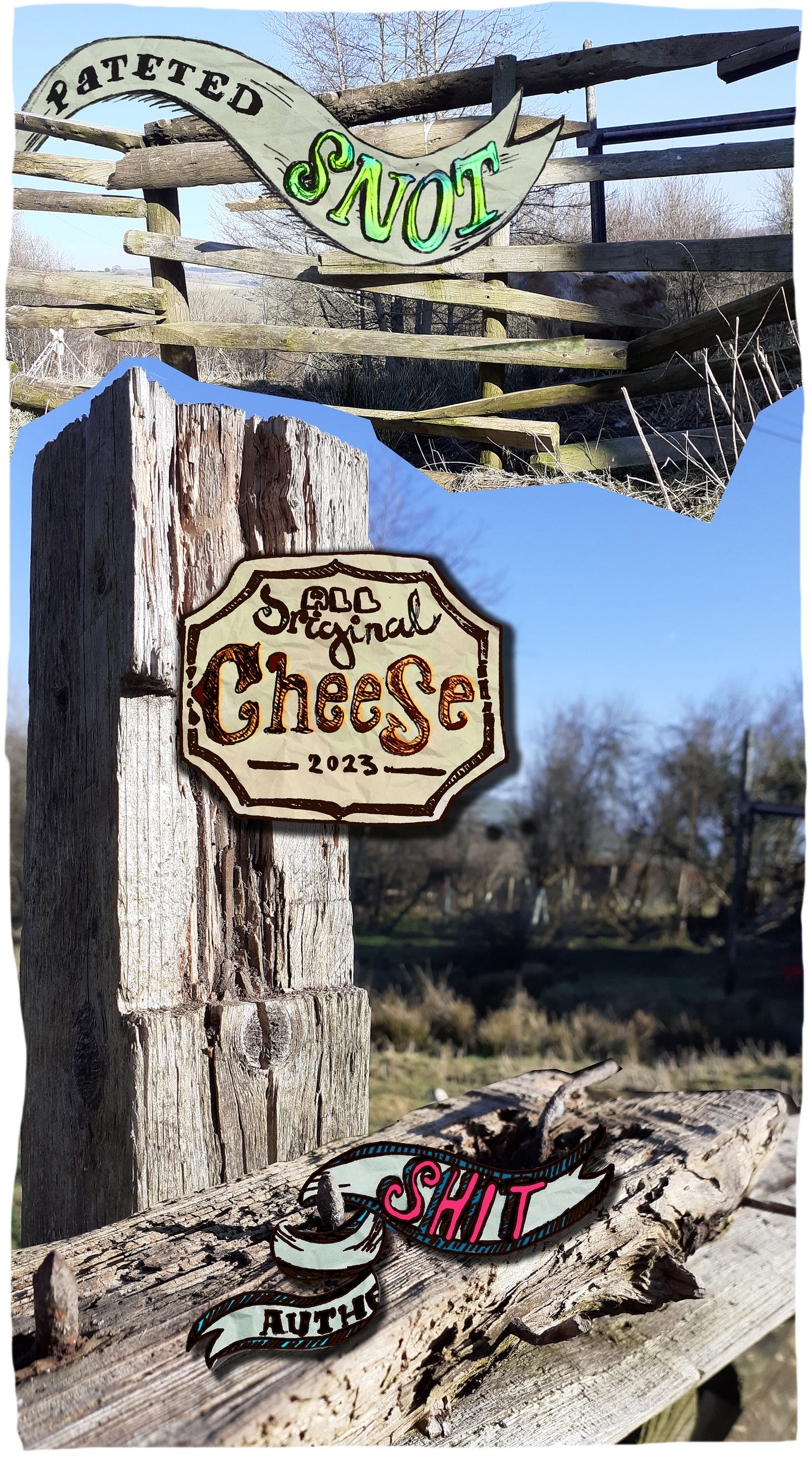
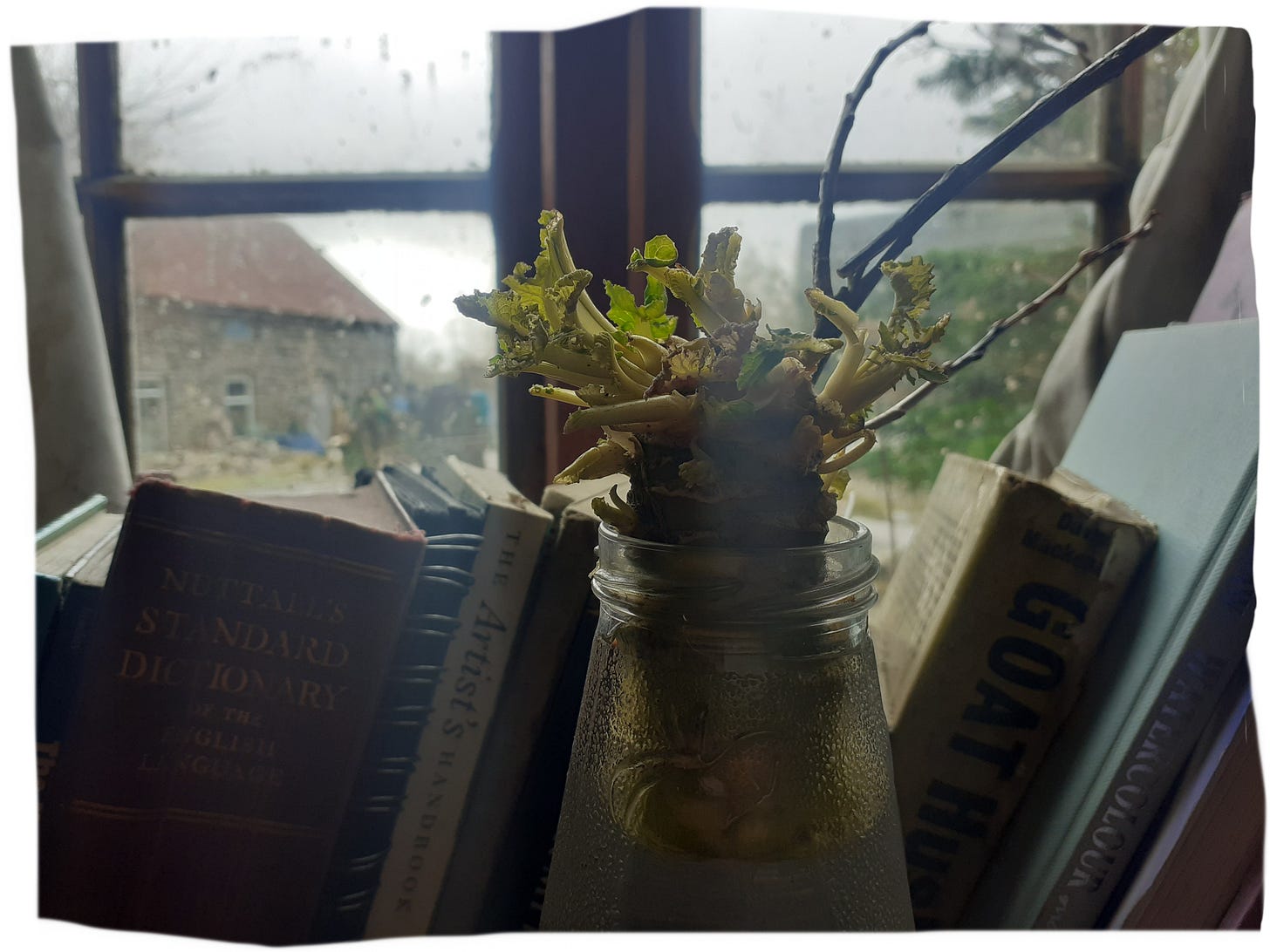
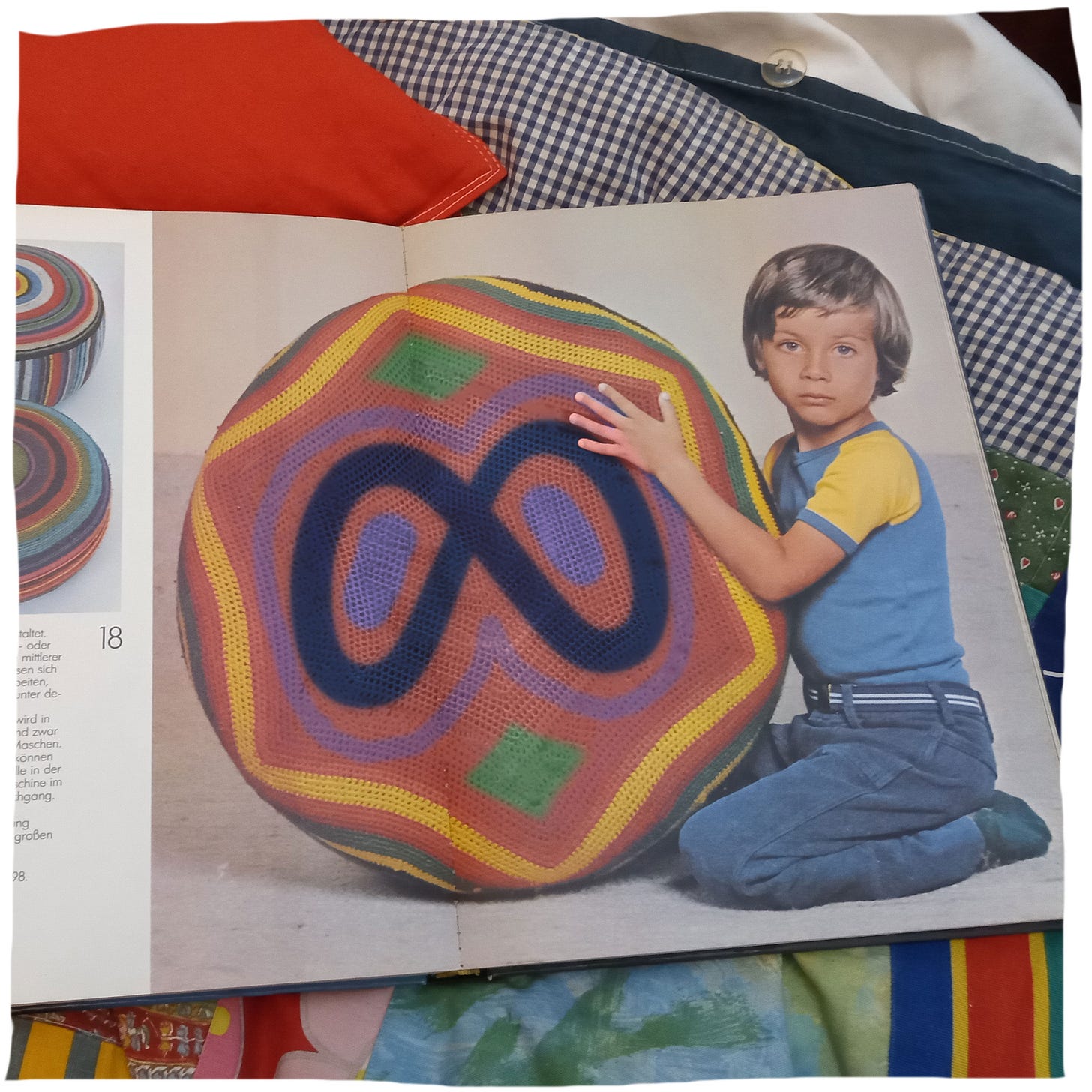
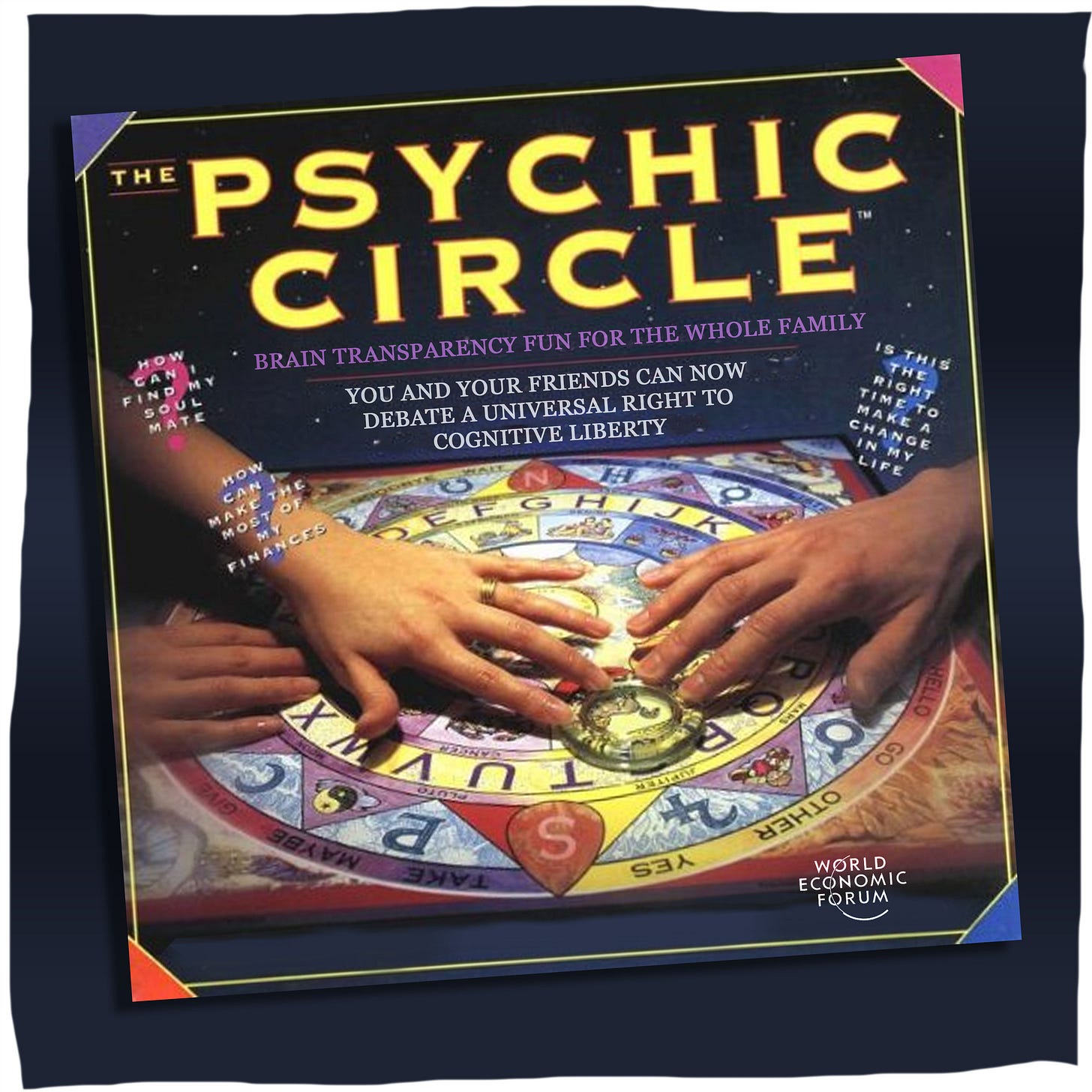

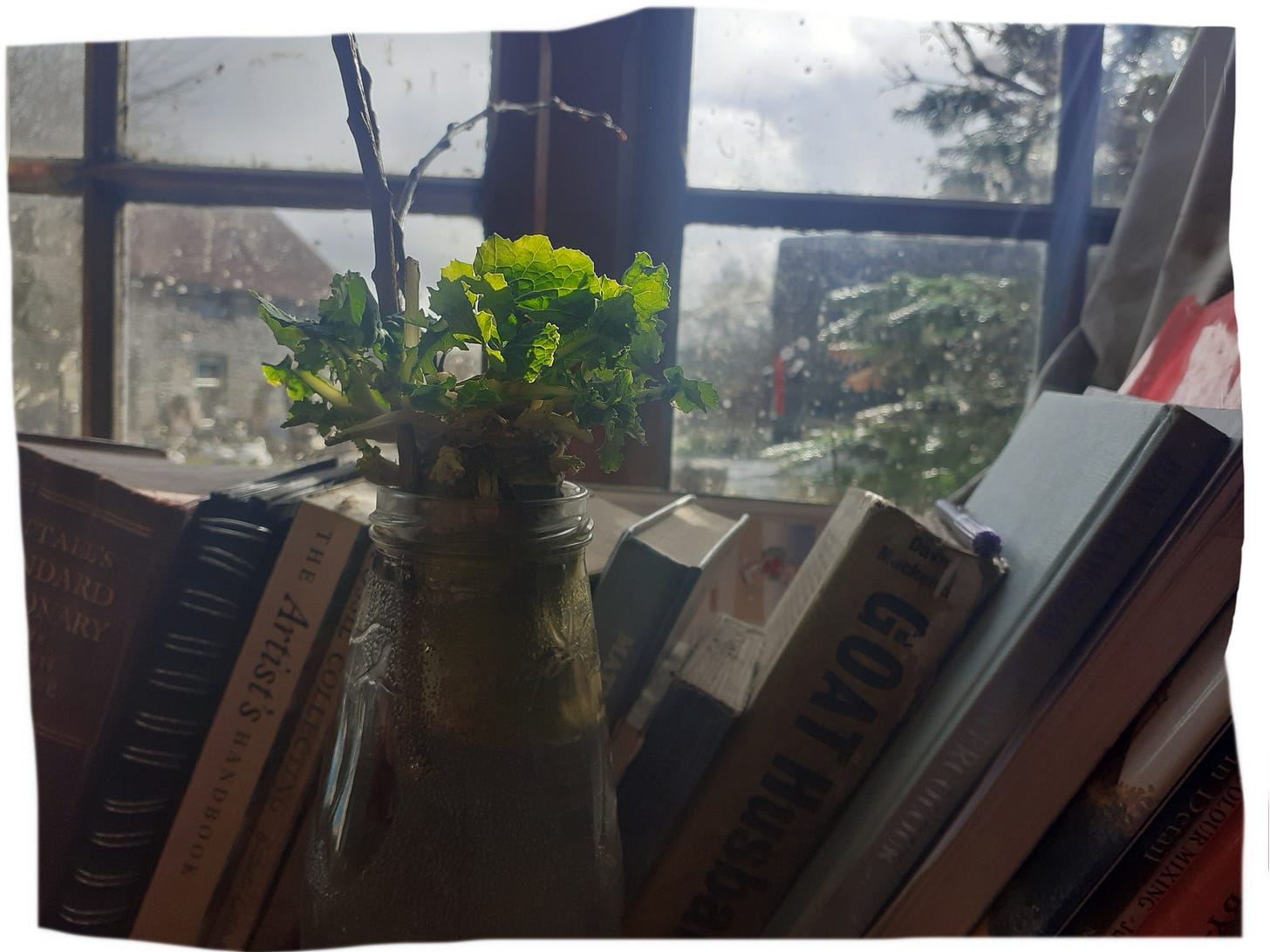
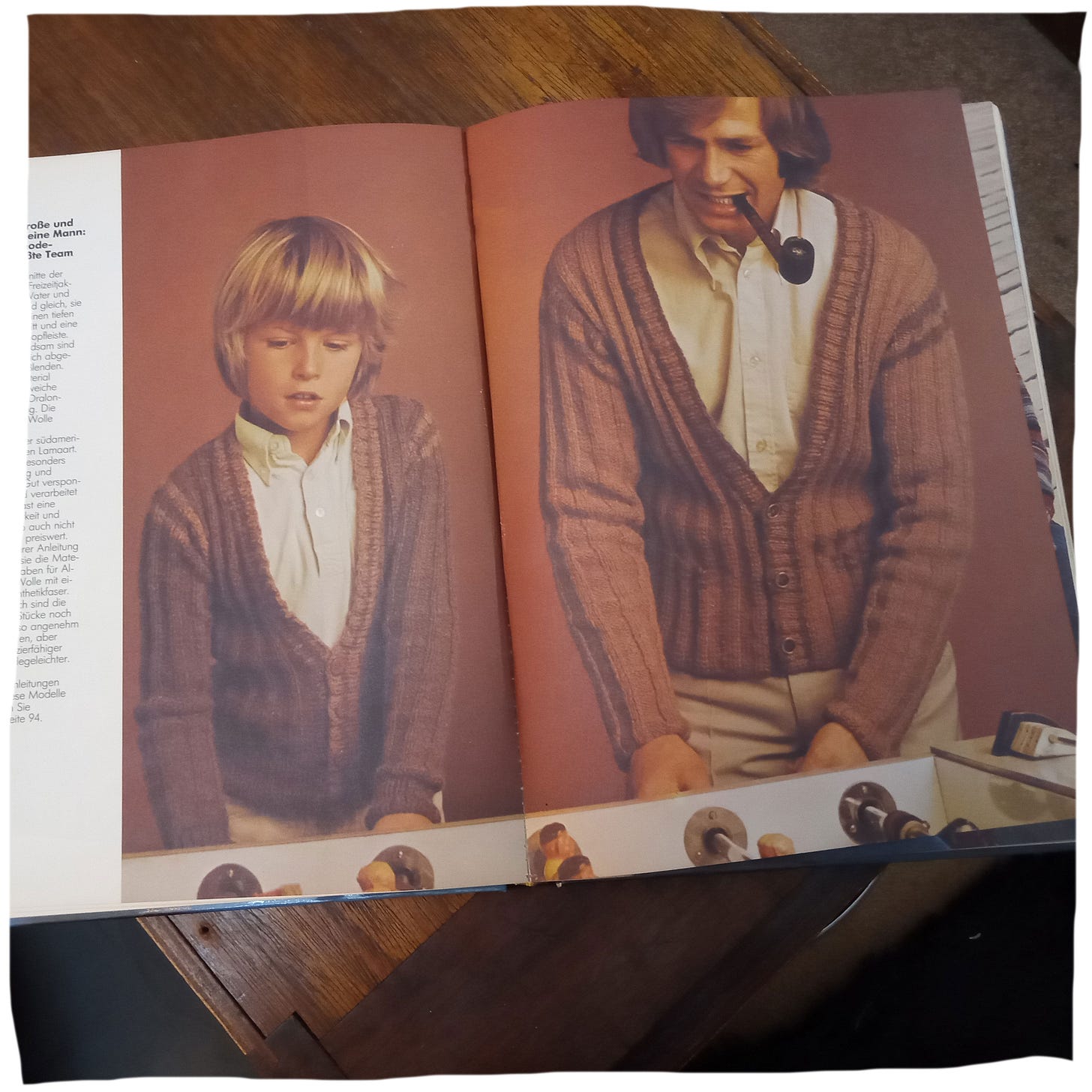
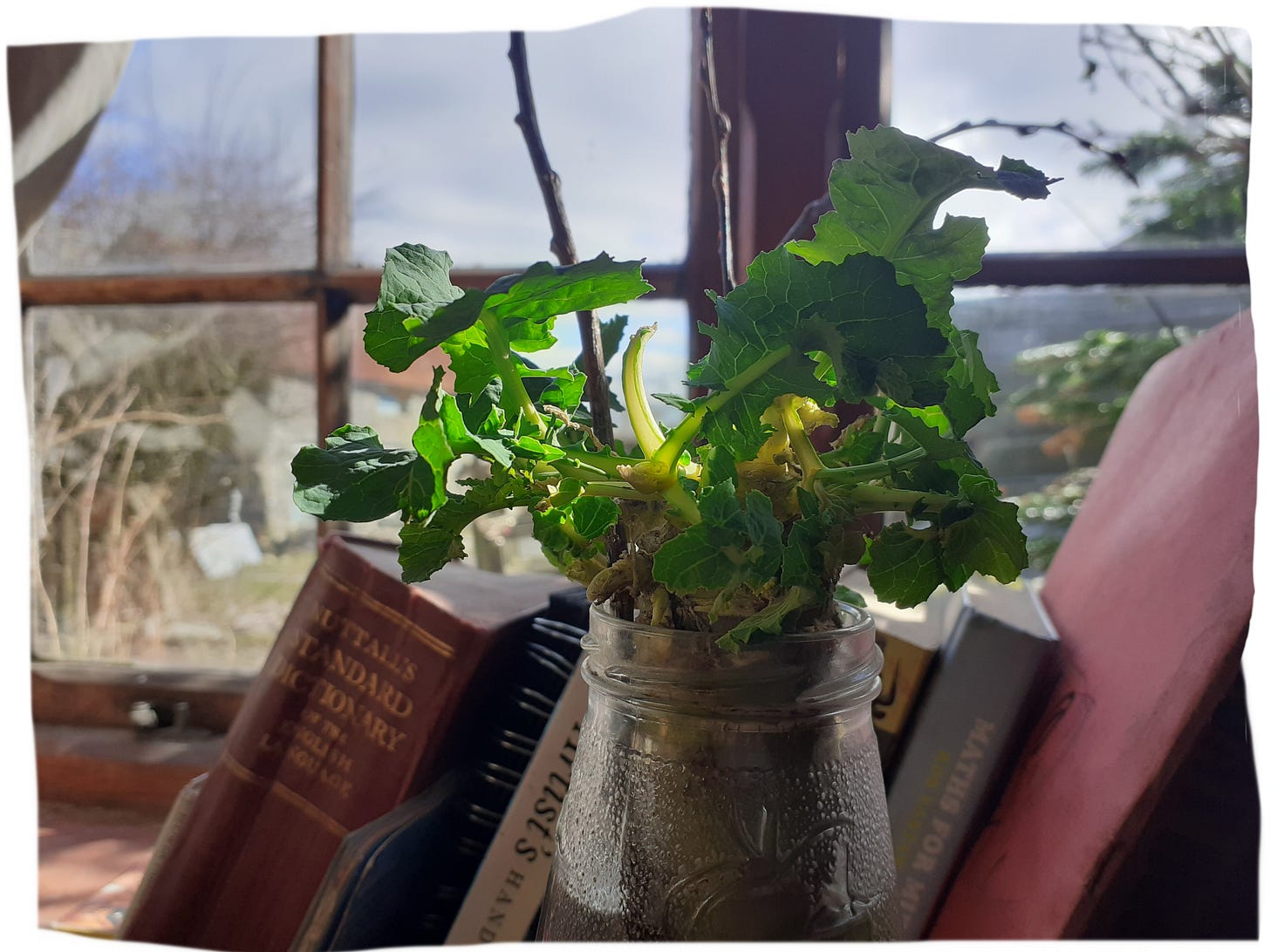
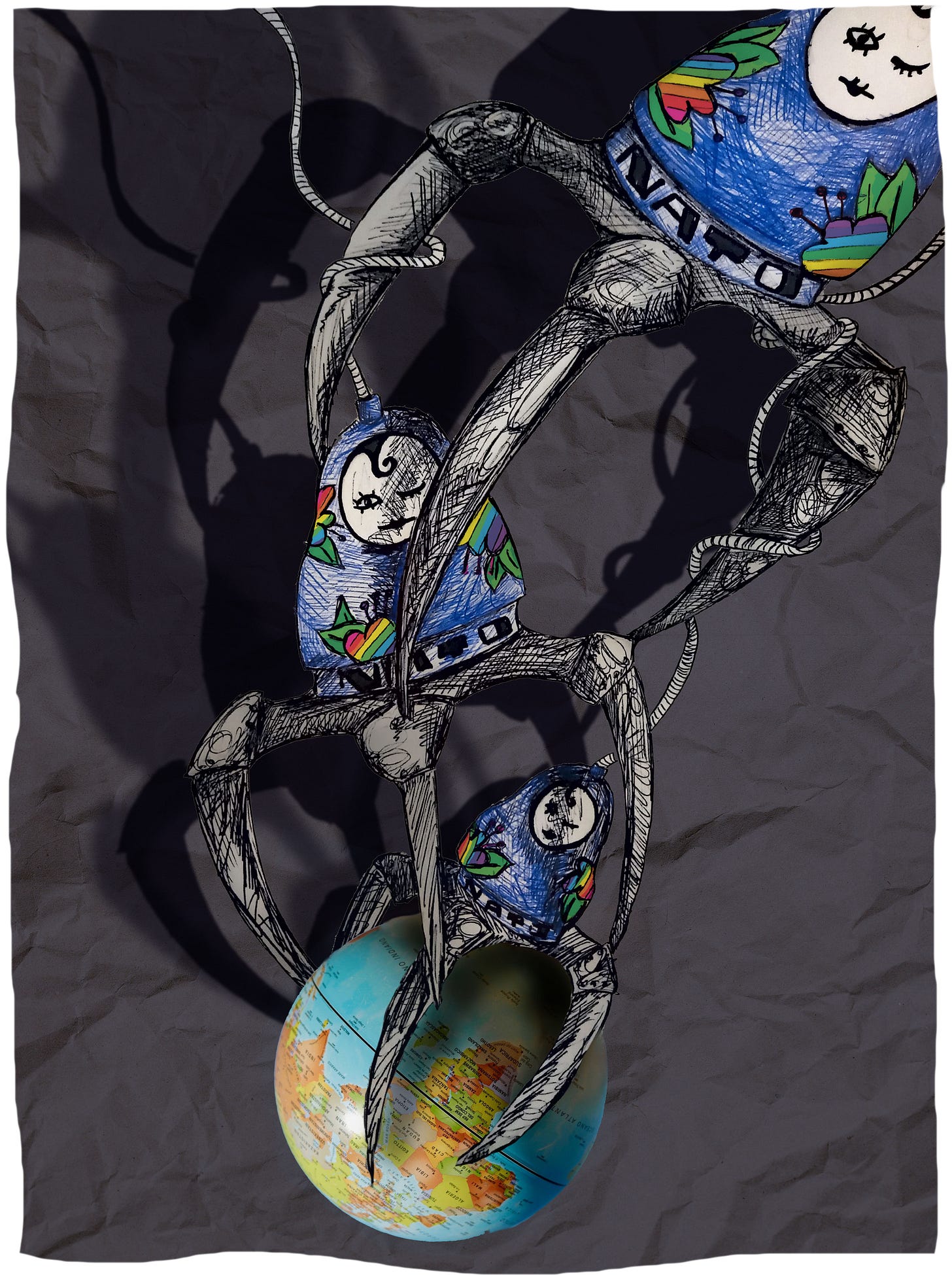
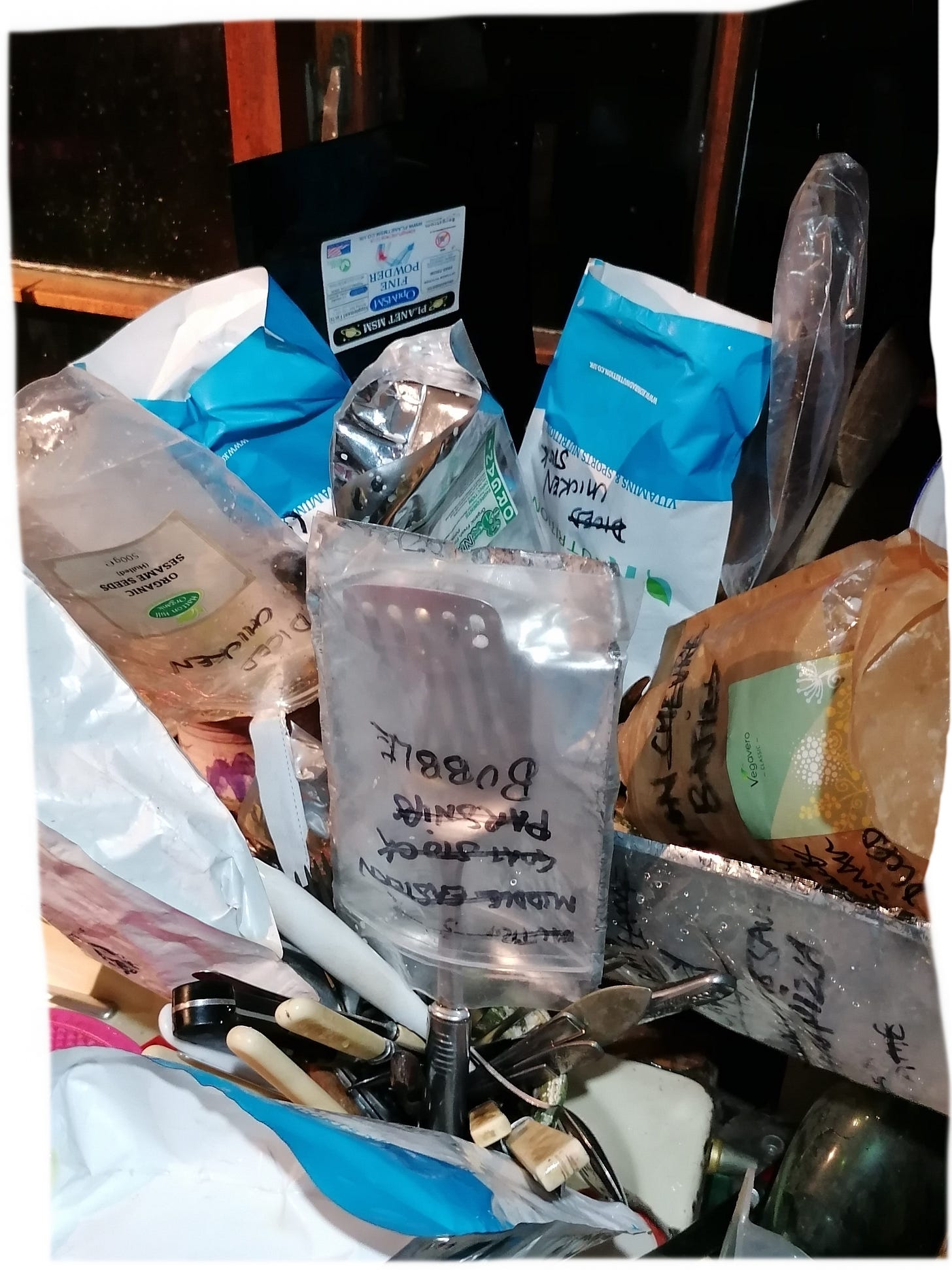
Amazing piece. Your description of how to trap a roaming spirit was gut-wrenching in its veracity. These are the true prices we pay for living in unnatural, organized hierarchies, where the people at the top are untethered from Earth and from their responsibilities as human beings. Those at the top will lead us to the most destructive behaviors, ones benefitting no one, not even our vainglorious leaders in the long run, leaving us clutching onto forgotten yet vital moral lessons like "Kindness matters, even if it doesn't win." Thanks for this! Will repost this on LinkedIn...
Whatever an artificial womb yields, it will not be fit, it will not be whole. I will not love it or eat it. I think they are propping these wombs just to 'cover' the infertility crises they has been manufactured by the Rockefeller poison medicines and all the Endocrine distuptors that muddle our sexuality. Middlesex, new meaning, not just a town anymore, rather a people unable to procreate. I did not have any kids, nor my sister. I come to a place where I believe it was more by design than I had ever imagined.